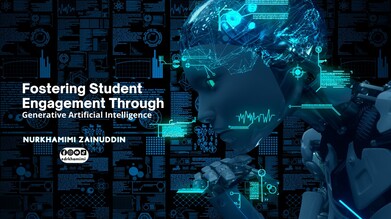
Fostering Student Engagement Through Generative Artificial Intelligence
Click on the image to download the slides
What is Prompting Framework?
The prompting framework, also known as *chain prompting*, *prompt stacking*, or *prompt priming*, uses ChatGPT to ask a series of questions in a particular sequence. This method allows for a more comprehensive topic exploration, with each question building upon the previous one to produce a well-rounded response. In the context of teaching, the prompting framework can be used to create lesson plans, learning activities, and assessments that are engaging, interactive, and practical. Using ChatGPT in this way is like having a teacher buddy who has been teaching for more than 20 years and is always willing to help (hard to find in real life). In this example, substitute [the topic] with your own topic or complex concept that you want to learn or teach. Note that you don't have to use all the prompts, and you don't have to use them in the order shown in the list.
1. General questions: I find that my students always struggle to understand [the topic]. What would you suggest as the best strategies I can use to help my students learn [the topic]?
2. 80/20 Pareto principle: What are KEY (CRUCIAL) concepts students must understand about the [topic]? Break it down into 3 main concepts and briefly summarise each one.
3. Explain to a child: Great! Now, I want to challenge you to explain 3 main concepts of "[the topic] to a child.
4. Explain creatively: Act as a creative teacher. Explain the [topic/concept] to [age of learners, e.g., 10-year old] ] in less than [number of words]. Write in an informative and entertaining way using metaphors, analogies, personification and figurative language*.
5. Create a mind/concept map: Create a mind map on the topic of [insert topic]. Include key concepts, ideas, and their relationships in your mind map. Make sure your mind map is well-structured and organised around a central theme. Keep the mind map concise and focused, highlighting the most important information. Use the following format for your mind map:
Central Theme: [Insert central theme]
- Subtopic 1: [Insert subtopic]
- Idea 1: [Insert idea]
- Idea 2: [Insert idea]
- Subtopic 2: [Insert subtopic]
- Idea 3: [Insert idea]
- Idea 4: [Insert idea]
**Note: For a visual mind map, use Miro (free).
6. Provide real-life examples: I’m teaching [the topic] to eighth-grade students. Help me with real-life examples to explain the concept of probability in a way that the students can easily relate to.
7. Provide case study: Can you provide a case study on how the knowledge of [topic/concept] has been used in [state the examples, e.g., weather forecast, insurance risk assessment, to project population growth, sports analytics, the likelihood of environmental hazards, like earthquakes or floods, etc.] to demonstrate the practical relevance of the concept?
8. Provide specific examples: Can you give examples where [topic] data on [the case study, example] help decision-making?
9. Gamify: How would you demonstrate or gamify the concept of [topic/concept] in the classroom?
10. Discussion simulation (inquiry-based learning): Based on the lesson plan, create a discussion simulation where the teacher and the students engage in questions and answers to clarify the concept of [topic/concept].
11. Use story-telling: Create an intriguing mystery-based story to invoke eighth graders' curiosity about [topic/concept].
12. Provoke ChatGPT: My students are still struggling to understand the concept of [concept/topic]. What should I do now? (Alternatively, use this prompt: I want you to act as a harsh critic, look at the previous output, and improve them.)
13. Create a lesson plan: Please prepare a lesson plan to explain the concept of [topic] to the eighth graders using [specific example] as an example.
Click on the image to download the slides
What is Prompting Framework?
The prompting framework, also known as *chain prompting*, *prompt stacking*, or *prompt priming*, uses ChatGPT to ask a series of questions in a particular sequence. This method allows for a more comprehensive topic exploration, with each question building upon the previous one to produce a well-rounded response. In the context of teaching, the prompting framework can be used to create lesson plans, learning activities, and assessments that are engaging, interactive, and practical. Using ChatGPT in this way is like having a teacher buddy who has been teaching for more than 20 years and is always willing to help (hard to find in real life). In this example, substitute [the topic] with your own topic or complex concept that you want to learn or teach. Note that you don't have to use all the prompts, and you don't have to use them in the order shown in the list.
1. General questions: I find that my students always struggle to understand [the topic]. What would you suggest as the best strategies I can use to help my students learn [the topic]?
2. 80/20 Pareto principle: What are KEY (CRUCIAL) concepts students must understand about the [topic]? Break it down into 3 main concepts and briefly summarise each one.
3. Explain to a child: Great! Now, I want to challenge you to explain 3 main concepts of "[the topic] to a child.
4. Explain creatively: Act as a creative teacher. Explain the [topic/concept] to [age of learners, e.g., 10-year old] ] in less than [number of words]. Write in an informative and entertaining way using metaphors, analogies, personification and figurative language*.
5. Create a mind/concept map: Create a mind map on the topic of [insert topic]. Include key concepts, ideas, and their relationships in your mind map. Make sure your mind map is well-structured and organised around a central theme. Keep the mind map concise and focused, highlighting the most important information. Use the following format for your mind map:
Central Theme: [Insert central theme]
- Subtopic 1: [Insert subtopic]
- Idea 1: [Insert idea]
- Idea 2: [Insert idea]
- Subtopic 2: [Insert subtopic]
- Idea 3: [Insert idea]
- Idea 4: [Insert idea]
**Note: For a visual mind map, use Miro (free).
6. Provide real-life examples: I’m teaching [the topic] to eighth-grade students. Help me with real-life examples to explain the concept of probability in a way that the students can easily relate to.
7. Provide case study: Can you provide a case study on how the knowledge of [topic/concept] has been used in [state the examples, e.g., weather forecast, insurance risk assessment, to project population growth, sports analytics, the likelihood of environmental hazards, like earthquakes or floods, etc.] to demonstrate the practical relevance of the concept?
8. Provide specific examples: Can you give examples where [topic] data on [the case study, example] help decision-making?
9. Gamify: How would you demonstrate or gamify the concept of [topic/concept] in the classroom?
10. Discussion simulation (inquiry-based learning): Based on the lesson plan, create a discussion simulation where the teacher and the students engage in questions and answers to clarify the concept of [topic/concept].
11. Use story-telling: Create an intriguing mystery-based story to invoke eighth graders' curiosity about [topic/concept].
12. Provoke ChatGPT: My students are still struggling to understand the concept of [concept/topic]. What should I do now? (Alternatively, use this prompt: I want you to act as a harsh critic, look at the previous output, and improve them.)
13. Create a lesson plan: Please prepare a lesson plan to explain the concept of [topic] to the eighth graders using [specific example] as an example.
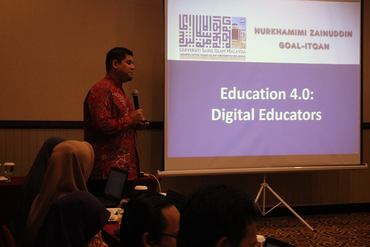
Education 4.0: Digital Educators
Education in the 21st century is all about embracing digital technology. The Government’s aspiration for our future generation is for them to be tech-savvy. This is living with the changing times.
Previous Higher Education Minister Datuk Seri Idris Jusoh recently said that universities have to be prepared to adapt and change their curriculum and delivery so that graduates are able to fill in jobs which are yet to emerge. Technology is moving rapidly and educators have to keep up with this fast pace.
In the Education 4.0 framework, it is imperative that students are equipped with ICT and collaborative skills and be interested in lifelong learning. They also need to have critical and creative thinking and communicative skills.
Education in the 21st century is all about embracing digital technology. The Government’s aspiration for our future generation is for them to be tech-savvy. This is living with the changing times.
Previous Higher Education Minister Datuk Seri Idris Jusoh recently said that universities have to be prepared to adapt and change their curriculum and delivery so that graduates are able to fill in jobs which are yet to emerge. Technology is moving rapidly and educators have to keep up with this fast pace.
In the Education 4.0 framework, it is imperative that students are equipped with ICT and collaborative skills and be interested in lifelong learning. They also need to have critical and creative thinking and communicative skills.
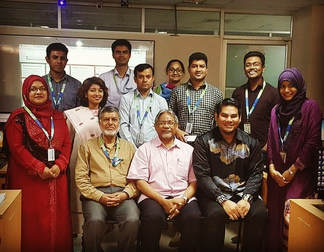
Technology Enhanced Learning (TEL) Workshop
This course is for teaching staff and aims to provide you with an overview of technology enhanced learning (TEL) and assessment. It provides some principles and strategies underpinning successful use of TEL, focusing particularly on a blended context where students have a mixture of online and face-to-face learning experiences. During the course activities you will also be able to try out a range of technologies
By the end of the course you should be able to:
1. Demonstrate awareness of the importance and role of TEL in contemporary Higher Education, and describe examples of its use , including potential benefits and considerations
2. Explain principles underpinning the design of online and blended courses and key considerations when planning them
3. Analyse how different technologies can support different types of learning, teaching and assessment activities, and compare the use of institutionally supported technologies and those on the open web, in order to make informed decisions
4. Describe strategies for facilitating, managing and evaluating online and blended learning activities, demonstrating awareness of the importance of the tutor role online
This course is for teaching staff and aims to provide you with an overview of technology enhanced learning (TEL) and assessment. It provides some principles and strategies underpinning successful use of TEL, focusing particularly on a blended context where students have a mixture of online and face-to-face learning experiences. During the course activities you will also be able to try out a range of technologies
By the end of the course you should be able to:
1. Demonstrate awareness of the importance and role of TEL in contemporary Higher Education, and describe examples of its use , including potential benefits and considerations
2. Explain principles underpinning the design of online and blended courses and key considerations when planning them
3. Analyse how different technologies can support different types of learning, teaching and assessment activities, and compare the use of institutionally supported technologies and those on the open web, in order to make informed decisions
4. Describe strategies for facilitating, managing and evaluating online and blended learning activities, demonstrating awareness of the importance of the tutor role online
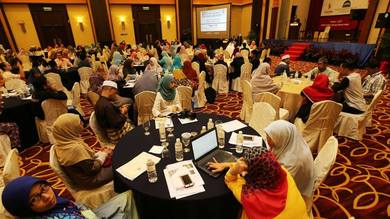
21st Century Pedagogy for Arabic Language
21st century Arabic teaching and learning debatably needs rethinking. Our classrooms repeatedly still mirror those of the Victorian era and education may be viewed as ‘traditional’ and ‘boring’ with students motivation and engagement frequently a problem. Lessons are often not reflective of a rapidly developing 21st century landscape. To be successful contributors to a 21st century society and economy, Arabic language students should be encouraged to take risks with their learning, challenge conventional boundaries, critically engage with the world around them, solve problems, develop resilience, be innovative and imaginative, make mistakes and have the freedom to express themselves. Exposure to creative scholarly pedagogy that inspire Arabic language learning facets is vital.
21st century Arabic teaching and learning debatably needs rethinking. Our classrooms repeatedly still mirror those of the Victorian era and education may be viewed as ‘traditional’ and ‘boring’ with students motivation and engagement frequently a problem. Lessons are often not reflective of a rapidly developing 21st century landscape. To be successful contributors to a 21st century society and economy, Arabic language students should be encouraged to take risks with their learning, challenge conventional boundaries, critically engage with the world around them, solve problems, develop resilience, be innovative and imaginative, make mistakes and have the freedom to express themselves. Exposure to creative scholarly pedagogy that inspire Arabic language learning facets is vital.
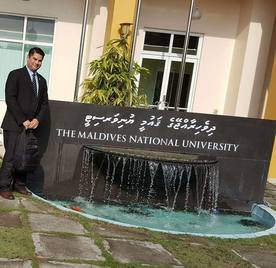
Powerful Web 2.0 Tools For Open & Distance Learning
Powerful Web 2.0 Tools for Open & Distance Learning is designed to provide non-technology-oriented educators with strategies to effectively integrate Web 2.0 technologies into their Open & Distance Learning process. Our approach focuses on the task rather than the tool in an effort to improve communication, collaboration, presentation, creativity, problem solving, and critical thinking in your learners. A strategic purpose of the course is to introduce educators to the terminology and the various aspects of Web 2.0 world. This is a lecture, discussion and a hands-on course that will involve participants creating their own Web 2.0 sites, by using popular web 2.0 tools. Following the guidance of the instructor, each participant will create their own live website of their own design.
Powerful Web 2.0 Tools for Open & Distance Learning is designed to provide non-technology-oriented educators with strategies to effectively integrate Web 2.0 technologies into their Open & Distance Learning process. Our approach focuses on the task rather than the tool in an effort to improve communication, collaboration, presentation, creativity, problem solving, and critical thinking in your learners. A strategic purpose of the course is to introduce educators to the terminology and the various aspects of Web 2.0 world. This is a lecture, discussion and a hands-on course that will involve participants creating their own Web 2.0 sites, by using popular web 2.0 tools. Following the guidance of the instructor, each participant will create their own live website of their own design.
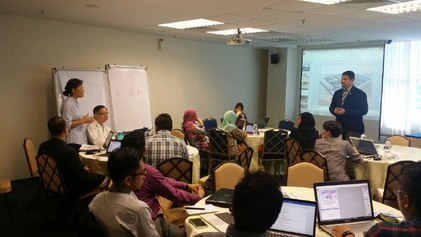
Digital Education Leadership Action Training (DELAT)
DELAT consists of 3 modules, namely: Digital Leadership Management, Digital Education, and Digital Threats. DELAT modules can be used independently as individual modules or can be combined all together. Each module is integrated with online learning management system. This platform will be independently updated from time to time. All modules content relevant link and access to materials from the internet and books, accompanied by online activities. At the end of each module, participants will be given a generic task with a specific scope regarding their own institutions that need to be presented at the end of the programme. This task will test participants’ understanding on all of the topics they have learnt, and will put them in the ‘real-scenario’ situations dealing with real-issues, for better understanding on digital leadership, while providing real solutions.
DELAT consists of 3 modules, namely: Digital Leadership Management, Digital Education, and Digital Threats. DELAT modules can be used independently as individual modules or can be combined all together. Each module is integrated with online learning management system. This platform will be independently updated from time to time. All modules content relevant link and access to materials from the internet and books, accompanied by online activities. At the end of each module, participants will be given a generic task with a specific scope regarding their own institutions that need to be presented at the end of the programme. This task will test participants’ understanding on all of the topics they have learnt, and will put them in the ‘real-scenario’ situations dealing with real-issues, for better understanding on digital leadership, while providing real solutions.
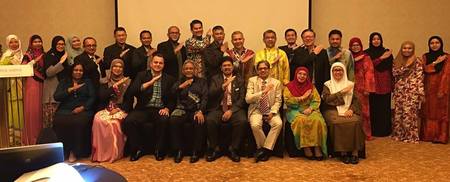
National Consultation On OER Policy in Malaysia
Open Educational Resources (OERs) are teaching, learning and research materials that are available free of cost and with an open license, which allows use, adaptation and redistribution by others with no or limited restrictions. The term was coined in 2002 at the Forum on the Impact of Open Courseware for Higher Education in Developing Countries organised by UNESCO, and in 2012 the Commonwealth of Learning (COL) and UNESCO organised the World OER Congress, which resulted in the OER Paris declaration that urges government to release public funded teaching and learning materials to be released with an open license. Several countries are engaged in content development to improve the quality of learning, and some of them have taken steps to adopt OER policy. Adoption of OER policy at a national level provides a framework to open up access to public funded educational resources such as textbooks and multimedia materials; encourages educational institutions to release contents produced by them; increases reuse of existing materials and reduces cost of production of learning content; and improves teaching and learning by empowering teachers to develop and adapt contents for their use.
The objectives of the two days national consultation shall be to:
• Engage with relevant stakeholders to discuss the need of OER policy for Malaysia;
• Discuss and refine the draft of OER policy; and
• Discuss a strategy for adoption and implementation of OER policy for Malaysia.
Open Educational Resources (OERs) are teaching, learning and research materials that are available free of cost and with an open license, which allows use, adaptation and redistribution by others with no or limited restrictions. The term was coined in 2002 at the Forum on the Impact of Open Courseware for Higher Education in Developing Countries organised by UNESCO, and in 2012 the Commonwealth of Learning (COL) and UNESCO organised the World OER Congress, which resulted in the OER Paris declaration that urges government to release public funded teaching and learning materials to be released with an open license. Several countries are engaged in content development to improve the quality of learning, and some of them have taken steps to adopt OER policy. Adoption of OER policy at a national level provides a framework to open up access to public funded educational resources such as textbooks and multimedia materials; encourages educational institutions to release contents produced by them; increases reuse of existing materials and reduces cost of production of learning content; and improves teaching and learning by empowering teachers to develop and adapt contents for their use.
The objectives of the two days national consultation shall be to:
• Engage with relevant stakeholders to discuss the need of OER policy for Malaysia;
• Discuss and refine the draft of OER policy; and
• Discuss a strategy for adoption and implementation of OER policy for Malaysia.
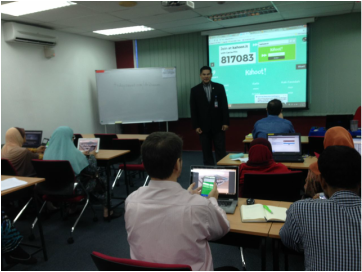
Writing A Newspaper Article: Tips & Techniques
In this 1-day workshop, the participants will enjoy the creative, exciting, and stimulating lesson in writing as they create authentic newspaper articles. As they are transformed into reporters and editors, they will become effective users of ICT in order to publish their own newspaper articles. Various aspects of newspapers are covered, including parts of a newspaper, newspaper reading habits, layout and writing tips and techniques.
Specifically, the participants will:
• Identify basic elements in newspaper article content
• Apply the Who -What -When -Where -Why -How writing technique
• Participate in peer editing via World Café discussion concept
• Put their skills to immediate use by writing their own newspaper article
The slide: http://bit.do/WNPA
In this 1-day workshop, the participants will enjoy the creative, exciting, and stimulating lesson in writing as they create authentic newspaper articles. As they are transformed into reporters and editors, they will become effective users of ICT in order to publish their own newspaper articles. Various aspects of newspapers are covered, including parts of a newspaper, newspaper reading habits, layout and writing tips and techniques.
Specifically, the participants will:
• Identify basic elements in newspaper article content
• Apply the Who -What -When -Where -Why -How writing technique
• Participate in peer editing via World Café discussion concept
• Put their skills to immediate use by writing their own newspaper article
The slide: http://bit.do/WNPA
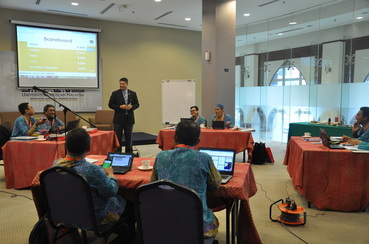
Powerful Web 2.0 Tools For Foreign Language Blended Learning
Powerful Web 2.0 Tools for Foreign Language Blended Learning is designed to provide non-technology-oriented educators with strategies to effectively integrate Web 2.0 technologies into their foreign language teaching and learning (TnL) process. Our approach focuses on the task rather than the tool in an effort to improve communication, collaboration, presentation, creativity, problem solving, and critical thinking in your learners. A strategic purpose of the course is to introduce educators to the terminology and the various aspects of Web 2.0 world. This is a lecture, discussion and a hands-on course that will involve participants creating their own Web 2.0 sites, by using popular web 2.0 tools. Following the guidance of the instructor, each participant will create their own live website of their own design.
Log on to : http://usimteaching.weebly.com
Powerful Web 2.0 Tools for Foreign Language Blended Learning is designed to provide non-technology-oriented educators with strategies to effectively integrate Web 2.0 technologies into their foreign language teaching and learning (TnL) process. Our approach focuses on the task rather than the tool in an effort to improve communication, collaboration, presentation, creativity, problem solving, and critical thinking in your learners. A strategic purpose of the course is to introduce educators to the terminology and the various aspects of Web 2.0 world. This is a lecture, discussion and a hands-on course that will involve participants creating their own Web 2.0 sites, by using popular web 2.0 tools. Following the guidance of the instructor, each participant will create their own live website of their own design.
Log on to : http://usimteaching.weebly.com
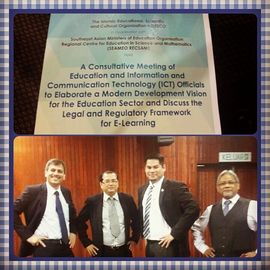
Legal and Regulatory Framework for E-Learning
To better understand the complex interplay of public policy drivers regulating e-learning, the Islamic Educational, Scientific and Cultural Organization (ISESCO) in cooperation with Southeast Asian Ministers of Education Organisation Regional Centre for Education in Science and Mathematics (SEAMEO RECSAM) convened a meeting of experts in September 2016 for a preliminary examination of existing and emerging public policies that will shape its regulation both domestically and internationally. The participants represented a variety of perspectives in higher education, regulation, and e-learning. Our discussions focused on a preliminary examination of existing and emerging public policies. Specifically, the participants discussed about the public policy issues that drive regulation, with particular emphasis on the imperatives that underlie domestic and international regulation of tertiary education, from both an institutional and a learner perspective.
The report : http://bit.do/ISESCO2016
To better understand the complex interplay of public policy drivers regulating e-learning, the Islamic Educational, Scientific and Cultural Organization (ISESCO) in cooperation with Southeast Asian Ministers of Education Organisation Regional Centre for Education in Science and Mathematics (SEAMEO RECSAM) convened a meeting of experts in September 2016 for a preliminary examination of existing and emerging public policies that will shape its regulation both domestically and internationally. The participants represented a variety of perspectives in higher education, regulation, and e-learning. Our discussions focused on a preliminary examination of existing and emerging public policies. Specifically, the participants discussed about the public policy issues that drive regulation, with particular emphasis on the imperatives that underlie domestic and international regulation of tertiary education, from both an institutional and a learner perspective.
The report : http://bit.do/ISESCO2016
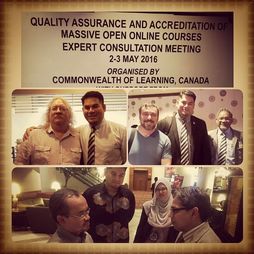
Quality Assurance and Accreditation of MOOC
Quality assurance and accreditation is a key issue that needs to be addressed in MOOCs. However, research focusing particularly on quality assurance and accreditation has remained limited so far, leading to a lack of comprehensive literature reviews on the issue. In this regard, the purpose of this presentation and associated paper is to discuss divergent opinions and issues in MOOC debate regarding quality assurance and accreditation, analyze current initiatives, discuss future trends and make recommendations for future practices. The participants are expected to contribute to the efforts of establishing policies for quality assurance and accreditation of MOOCs, and guide policy makers, administrators and practitioners in universities, quality assurance and accreditation agencies and governments as well as MOOC providers.
Get your own copy : http://bit.do/MOOCQA
Quality assurance and accreditation is a key issue that needs to be addressed in MOOCs. However, research focusing particularly on quality assurance and accreditation has remained limited so far, leading to a lack of comprehensive literature reviews on the issue. In this regard, the purpose of this presentation and associated paper is to discuss divergent opinions and issues in MOOC debate regarding quality assurance and accreditation, analyze current initiatives, discuss future trends and make recommendations for future practices. The participants are expected to contribute to the efforts of establishing policies for quality assurance and accreditation of MOOCs, and guide policy makers, administrators and practitioners in universities, quality assurance and accreditation agencies and governments as well as MOOC providers.
Get your own copy : http://bit.do/MOOCQA
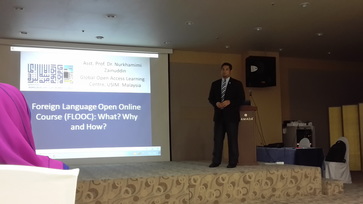
Foreign Language Open Online Course (FLOOC): What? Why and How?
Since 2011, a few studies have been conducted to explore the growth in open online courses such as Distributed Online Collaborative Courseware Courses (DOCC), Big Open Online Courses (BOOC), Synchronous Massive Online Courses (SMOC) and Small Private Online Courses (SPOC). However, to the best of authors’ knowledge, no report has been found so far using open online course to cater the needs of foreign language learners in terms of pedagogy, technicality and orthography. Foreign Language Open Online Course (FLOOC) that will be useful to develop and support the foreign languages blended learning especially in non-native learners’ context. In light of these prospects, the workshop will describe about the appropriate design principles for FLOOC design and development. This would substantially benefit foreign language learners and could help them obtain literacy skills and attain their potential.
Since 2011, a few studies have been conducted to explore the growth in open online courses such as Distributed Online Collaborative Courseware Courses (DOCC), Big Open Online Courses (BOOC), Synchronous Massive Online Courses (SMOC) and Small Private Online Courses (SPOC). However, to the best of authors’ knowledge, no report has been found so far using open online course to cater the needs of foreign language learners in terms of pedagogy, technicality and orthography. Foreign Language Open Online Course (FLOOC) that will be useful to develop and support the foreign languages blended learning especially in non-native learners’ context. In light of these prospects, the workshop will describe about the appropriate design principles for FLOOC design and development. This would substantially benefit foreign language learners and could help them obtain literacy skills and attain their potential.
Research Exhibitions
1. Gold Medal for I-TOURISM, PECIPTA22, International, 2022
2. Gold Medal for Building 21st Century Skills & Digitalised Pedagogy Through Animated Media Approach. ECONDEV 2021 UiTM 20-27 August 2021.
3. Gold Medal for Anime-Cs: A Task-Based Animated Approach For 21st Century Learning. IUCEL 2021 UUM 15 – 16 June 2021.
4. Bronze Medal for I-Tourism: Smart Phone Apps. Knovasi 2019. 23 – 24 Januari 2019.
5. Silver Medal for Inovasi Gamifikasi Global Arabic Game Dalam Pengajaran dan Pembelajaran. 29th International Invention, Innovation & Technology Exhibition (ITEX 2018). 10 – 12 May 2018.
6. Gold Medal for Integrated Naqli and Aqli Knowledge and Aqli Framework for Effective Dyslexia Arabic Language Learning Tools. UniCeL 2018, Universiti Sultan Zainal Abidin. 3 May 2018.
7. Gold Medal for MOOC Bahasa Arab Ibadah Melalui Kaedah Heutagogi. 1st International Media Literacy for Social Change Conference 2018, Universiti Malaysia Kelantan. 5 – 6 March 2018.
8. Bronze Medal for Islamic Tourism Need Analysis Model (I-Tourism). International University Carnival on e-Learning (IUCEL 2017), Universiti Sains Islam Malaysia. 26 – 27 September 2017.
9. Gold Medal for GLOw@CBI: Grammar Learning Online With Concept Based Instruction. International University Carnival on e-Learning (IUCEL 2017), Universiti Sains Islam Malaysia. 26 – 27 September 2017.
10. Outstanding Open Educational Resources (OER) Award. International University Carnival on e-Learning (IUCEL 2017), Universiti Sains Islam Malaysia. 26 – 27 September 2017.
11. Gold Medal for Gamifikasi Global Zakat Game (GZG) dalam e-Pembelajaran. International University Carnival on e-Learning (IUCEL 2017), Universiti Sains Islam Malaysia. 26 – 27 September 2017.
12. Silver Medal for i-Majrurat. International University Carnival on e-Learning (IUCEL 2017), Universiti Sains Islam Malaysia. 26 – 27 September 2017.
13. Silver Medal for Supervision Online Via E-Prasmo. K-Novasi, Universiti Kebangsaan Malaysia.15 – 16 February 2017.
14. Gold Medal for Gamifikasi Dalam Pendidikan: Global Zakat Game (V2.0). Invention & Innovation Awards 2017. Malaysia Technology Expo 2017. 16-18 February 2017.
15. Gold Medal for E-Prasmo: An Online Supervision Tool. 28th International Invention, Innovation & Technology Exhibition (ITEX 2017). 11 – 13 May 2017.
16. Gold Medal for Gamifikasi Dalam Pendidikan: Global Zakat Game (V2.0). 28th International Invention, Innovation & Technology Exhibition (ITEX 2017). 11 – 13 May 2017.
17. Gold Medal for Gamifikasi Global Zakat Game (GzakatG) Dalam E-Pembelajaran. K-Novasi, Universiti Kebangsaan Malaysia.15 – 16 February 2017.
18. Gold Medal for e-Prasmo 2.0: Revolutionising Teaching Practicum in The 21st Century Classroom. International University Carnival on E-Learning (IUCEL 2016). Universti Teknologi Malaysia. 21 – 22 September 2016.
19. Gold Award for I-Majrurat. International Exposition On Syariah Compliant Idea, Invention, Inovation & Design (ISCIIID 2016). Universiti Teknologi MARA. 21 – 22 November 2016.
20. Silver Award for Platform Pengujian Kemahiran Lisan Bahasa Arab. International Exposition On Syariah Compliant Idea, Invention, Inovation & Design (ISCIIID 2016). Universiti Teknologi MARA. 21 – 22 November 2016.
21. Gold Award for E-Prasmo: Your Digitised Supervision Solution. International Innovative Practices in Higher Education EXPO (I-PHEX 2016). Universiti Teknologi Malaysia. 10 August 2016.
22. Bronze Award for E-Prasmo 2.0: A Revolutionized Practicum Assessment Model. International Invention & Innovative Competition (InIIC Series 1/2016). 28 May 2016.
23. Silver Medal for Application of Apple ITunes U as an Educational Digital Repository Platform In USIM. Ekspo Inovasi Islam (I-Inova 15). Universiti Sains Islam Malaysia. 24 – 25 October 2015.
24. Bronze Medal for I-Majrurat. The International Conference and Exposition On Inventions (PECIPTA 15). Kuala Lumpur Convention Centre. 4 – 6 December 2015.
25. Bronze Medal for An Evaluation of Arabic Phonology Course Among School Teachers In A Hybrid Learning Environment. IIUM Research, Invention and Innovation Exhibition (IIRIE 2013), International Islamic University Malaysia. 19 – 20 February 2013.
26. Bronze Medal for Arabic ID-DGBL: An Instructional Design (ID) Model For E-Arabic Teaching and Learning. IIUM Research, Invention and Innovation Exhibition (IIRIE 2012), International Islamic University Malaysia. 21 – 22 February 2012.
27. Bronze Medal for The Impact Of Learning Arabic Via Online Games Prototype Among Elementary Learners in IIUM. Ekspo Inovasi Islam, Research and Innovation Exhibition (I-INOVA’11), Universiti Sains Islam Malaysia.14 – 16 October 2011.
28. Bronze Medal for The Impact Of Learning Arabic Via Online Games Prototype Among Elementary Learners in IIUM. Instructional Design Model For Arabic Teaching and Learning Using WIKI. Ekspo Inovasi Islam, Research and Innovation Exhibition (I-INOVA’11), Universiti Sains Islam Malaysia.14 – 16 October 2011.
1. Gold Medal for I-TOURISM, PECIPTA22, International, 2022
2. Gold Medal for Building 21st Century Skills & Digitalised Pedagogy Through Animated Media Approach. ECONDEV 2021 UiTM 20-27 August 2021.
3. Gold Medal for Anime-Cs: A Task-Based Animated Approach For 21st Century Learning. IUCEL 2021 UUM 15 – 16 June 2021.
4. Bronze Medal for I-Tourism: Smart Phone Apps. Knovasi 2019. 23 – 24 Januari 2019.
5. Silver Medal for Inovasi Gamifikasi Global Arabic Game Dalam Pengajaran dan Pembelajaran. 29th International Invention, Innovation & Technology Exhibition (ITEX 2018). 10 – 12 May 2018.
6. Gold Medal for Integrated Naqli and Aqli Knowledge and Aqli Framework for Effective Dyslexia Arabic Language Learning Tools. UniCeL 2018, Universiti Sultan Zainal Abidin. 3 May 2018.
7. Gold Medal for MOOC Bahasa Arab Ibadah Melalui Kaedah Heutagogi. 1st International Media Literacy for Social Change Conference 2018, Universiti Malaysia Kelantan. 5 – 6 March 2018.
8. Bronze Medal for Islamic Tourism Need Analysis Model (I-Tourism). International University Carnival on e-Learning (IUCEL 2017), Universiti Sains Islam Malaysia. 26 – 27 September 2017.
9. Gold Medal for GLOw@CBI: Grammar Learning Online With Concept Based Instruction. International University Carnival on e-Learning (IUCEL 2017), Universiti Sains Islam Malaysia. 26 – 27 September 2017.
10. Outstanding Open Educational Resources (OER) Award. International University Carnival on e-Learning (IUCEL 2017), Universiti Sains Islam Malaysia. 26 – 27 September 2017.
11. Gold Medal for Gamifikasi Global Zakat Game (GZG) dalam e-Pembelajaran. International University Carnival on e-Learning (IUCEL 2017), Universiti Sains Islam Malaysia. 26 – 27 September 2017.
12. Silver Medal for i-Majrurat. International University Carnival on e-Learning (IUCEL 2017), Universiti Sains Islam Malaysia. 26 – 27 September 2017.
13. Silver Medal for Supervision Online Via E-Prasmo. K-Novasi, Universiti Kebangsaan Malaysia.15 – 16 February 2017.
14. Gold Medal for Gamifikasi Dalam Pendidikan: Global Zakat Game (V2.0). Invention & Innovation Awards 2017. Malaysia Technology Expo 2017. 16-18 February 2017.
15. Gold Medal for E-Prasmo: An Online Supervision Tool. 28th International Invention, Innovation & Technology Exhibition (ITEX 2017). 11 – 13 May 2017.
16. Gold Medal for Gamifikasi Dalam Pendidikan: Global Zakat Game (V2.0). 28th International Invention, Innovation & Technology Exhibition (ITEX 2017). 11 – 13 May 2017.
17. Gold Medal for Gamifikasi Global Zakat Game (GzakatG) Dalam E-Pembelajaran. K-Novasi, Universiti Kebangsaan Malaysia.15 – 16 February 2017.
18. Gold Medal for e-Prasmo 2.0: Revolutionising Teaching Practicum in The 21st Century Classroom. International University Carnival on E-Learning (IUCEL 2016). Universti Teknologi Malaysia. 21 – 22 September 2016.
19. Gold Award for I-Majrurat. International Exposition On Syariah Compliant Idea, Invention, Inovation & Design (ISCIIID 2016). Universiti Teknologi MARA. 21 – 22 November 2016.
20. Silver Award for Platform Pengujian Kemahiran Lisan Bahasa Arab. International Exposition On Syariah Compliant Idea, Invention, Inovation & Design (ISCIIID 2016). Universiti Teknologi MARA. 21 – 22 November 2016.
21. Gold Award for E-Prasmo: Your Digitised Supervision Solution. International Innovative Practices in Higher Education EXPO (I-PHEX 2016). Universiti Teknologi Malaysia. 10 August 2016.
22. Bronze Award for E-Prasmo 2.0: A Revolutionized Practicum Assessment Model. International Invention & Innovative Competition (InIIC Series 1/2016). 28 May 2016.
23. Silver Medal for Application of Apple ITunes U as an Educational Digital Repository Platform In USIM. Ekspo Inovasi Islam (I-Inova 15). Universiti Sains Islam Malaysia. 24 – 25 October 2015.
24. Bronze Medal for I-Majrurat. The International Conference and Exposition On Inventions (PECIPTA 15). Kuala Lumpur Convention Centre. 4 – 6 December 2015.
25. Bronze Medal for An Evaluation of Arabic Phonology Course Among School Teachers In A Hybrid Learning Environment. IIUM Research, Invention and Innovation Exhibition (IIRIE 2013), International Islamic University Malaysia. 19 – 20 February 2013.
26. Bronze Medal for Arabic ID-DGBL: An Instructional Design (ID) Model For E-Arabic Teaching and Learning. IIUM Research, Invention and Innovation Exhibition (IIRIE 2012), International Islamic University Malaysia. 21 – 22 February 2012.
27. Bronze Medal for The Impact Of Learning Arabic Via Online Games Prototype Among Elementary Learners in IIUM. Ekspo Inovasi Islam, Research and Innovation Exhibition (I-INOVA’11), Universiti Sains Islam Malaysia.14 – 16 October 2011.
28. Bronze Medal for The Impact Of Learning Arabic Via Online Games Prototype Among Elementary Learners in IIUM. Instructional Design Model For Arabic Teaching and Learning Using WIKI. Ekspo Inovasi Islam, Research and Innovation Exhibition (I-INOVA’11), Universiti Sains Islam Malaysia.14 – 16 October 2011.
